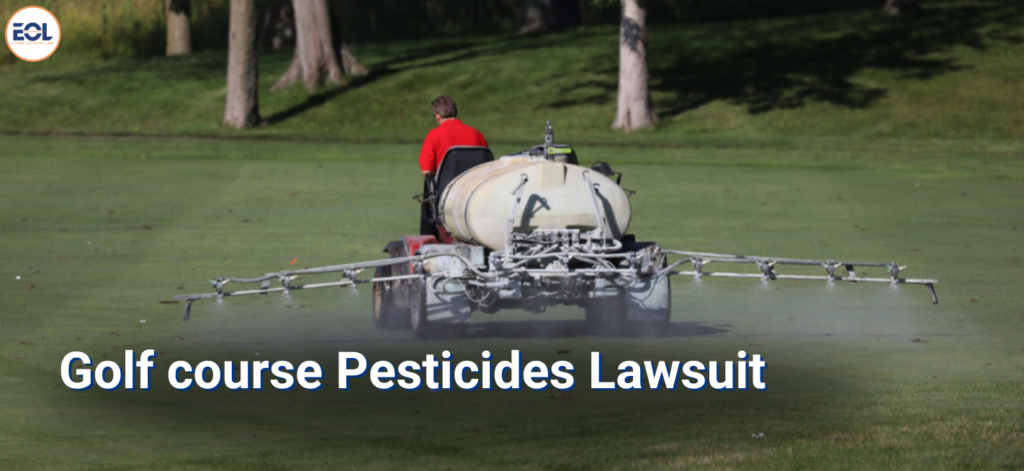Golf Course Pesticides Lawyer - Ethen Ostroff Law
Golf holds a special place in American hearts, offering a mix of fun, exercise, and socializing. Yet, behind the beauty of our golf courses lies a potential danger: the heavy use of chemicals like herbicides and pesticides. While these chemicals maintain the lush greens, they also carry serious health risks. Exposure to them can lead to severe conditions, including cancer. Those at risk include golf course staff, groundskeepers, players, caddies, and even nearby residents. There are broader lawsuits concerning cancers and other health problems linked to chemical exposure on golf courses. At Ethen Ostroff Law, our golf course pesticides lawyer helps those affected seek justice and compensation through lawsuits and other related legal actions.
Golf Courses in America: Beauty and Risk
Golf courses in America are like havens, offering a break from our busy lives. With their scenic beauty and well-kept greens, they attract players of all levels. Whether it’s a public course or a private club with fancy perks, each one has its charm.
But behind the scenes, it’s hard work keeping these courses in top shape. A team of dedicated workers starts early, doing everything from mowing to watering to make sure everything looks perfect. Sadly, this work comes with risks. Workers often face dangers from the chemicals used on the course. Even players and caddies, out for a day of fun, can unknowingly expose themselves to harmful substances. Simple habits like putting a golf tee in your mouth can lead to serious health issues like cancer. The impact of these actions goes beyond just the individuals involved, affecting their loved ones and communities deeply.
Golf Course Chemical Risks
Golf courses offer a serene escape to unwind amidst nature’s beauty. With the use of pesticides golf courses can maintain their lush appearance. But keeping these courses lush and green often involves using harmful chemical substances like pesticides. These chemicals affect not just the people who maintain the courses but also those who enjoy them. Two of the widely used ones have been linked to major health problems:
- Paraquat: Paraquat is a toxic herbicide. It requires certified applicators due to its extreme danger. Even a small sip can be fatal with no antidote. Despite its efficacy in combating weeds, Paraquat is associated with severe health concerns, including Parkinson’s disease and various cancers. For years, golf course workers used it extensively. This potentially exposed not only themselves but also golfers, caddies, and nearby residents to Paraquat’s harmful effects.
- Roundup: Roundup is another common herbicide. The chemical contains glyphosate, which studies have connected to non-Hodgkin’s lymphoma. Golf courses aiming for perfect greens have often used Roundup, risking the health of workers and players.
Health Impact of Golf Course Pesticides
Here are some of the health problems linked to pesticide exposure in golfing environments:
- Developmental problems, like low birth weight and organ growth issues.
- Gut bacteria disruption, leading to various health problems.
- Hodgkin’s lymphoma.
- Kidney damage in animals and humans.
- Leukemia.
- Lung damage, including scarring and fibrosis from ingesting or inhaling pesticides.
- Multiple myeloma.
- Non-Hodgkin lymphoma.
- Parkinson’s disease.
- Respiratory problems, like asthma.
- Vital organ failure, including liver and kidney damage.

Staying Safe from Golf Course Pesticides
Stay safe from potential pesticides exposure when spending time on golf courses. Here are proactive steps to take to help minimize the risk:
- Avoid direct contact: Avoid touching treated areas and keep your hands away from your face.
- Limit time on the course: Try to play when pesticides aren’t being sprayed, and steer clear of courses with recent treatments.
- Pick your spots: Look for courses that use organic or integrated pest management methods.
- Shower and change: After your round, take a shower and change clothes to wash off any pesticide residue.
- Snack smart: Skip eating or drinking on the course to steer clear of any pesticides that might be lingering in food or water.
- Stay informed: Ask about the pesticides used on the course. Find out when they’re applied to stay ahead of potential exposure.
- Suit up: Dress wisely. Wear long sleeves, pants, and closed-toe shoes. Use gloves and a hat for an extra layer of safety.
- Support pesticide reduction efforts: Support efforts to cut down on pesticide use by backing initiatives for safer practices.
Suits Against Chemical Companies
Due to concerning data, cases have been filed against chemical producers. Notable lawsuits include:
- MDL 2741: In October 2016, MDL No. 2741 was set up for Roundup lawsuits, alleging Roundup exposure caused cancers like non-Hodgkin’s lymphoma. Centralized in the U.S. District Court for the Northern District of California, there were 4,285 pending Roundup cases out of 4,859 filed as of June 2024. Judge Vince Chhabria oversees the cases. The MDL is ongoing as new cases are filed. Bayer, the company behind Roundup, has been advocating for legal protection from Roundup cancer claims in various states.
- MDL 3004: In June 2021, MDL No. 3004 was established for Paraquat cases, claiming Paraquat exposure led to Parkinson’s disease and other injuries. Centralized in the U.S. District Court for the Southern District of Illinois, there are about 5,318 active cases as of June 2024. Judge Nancy J. Rosenstengel oversees the MDL. Paraquat makers Syngenta Crop Protection LLC and Syngenta Corporation are the main defendants. MDL 3004 involves products like Gramoxone, Quick-Quat, Parazone, Helmquat, and Firestorm.
Legal Options for Those Exposed
There are ways to seek compensation and justice if you’ve been affected by golf course pesticides. Let’s explore your options:
- Class action lawsuits: People harmed by golf course pesticides can join forces in a class action lawsuit, sharing legal costs and strengthening their case against big companies.
- Environmental litigation: Communities affected by chemical runoff contaminating local water or soil can file environmental lawsuits to address and remedy the damage, including health impacts.
- Personal injury claims: Those who suffer health problems may bring personal injury lawsuits to recoup medical expenditures, lost wages, and other damages.
- Workers’ compensation claims: This option offers support to golf course employees affected by pesticide exposure, helping with medical bills and easing the burden of lost wages.
Potential Causes of Actions in a Lawsuit
If exposure to golf course pesticides has affected your health and you’re considering legal action, here are some claims you can consider:
- Breach of warranty: When promises about product safety, such as those made by chemical manufacturers or sellers, are not upheld.
- Fraud and misrepresentation: Holding companies responsible for pesticide safety misinformation on golf courses.
- Negligence: When individuals or entities, like golf course managers or chemical manufacturers, fail to take reasonable care, resulting in harm from pesticide exposure.
- Product liability: Holding chemical companies responsible for flawed or dangerous golf course pesticides that have caused health issues.
- Strict liability: Accepting responsibility for risks associated with hazardous chemicals, even in the absence of fault, especially concerning golf course pesticides.
Dealing with Health Issues
If you’re facing a health problem from pesticide exposure on golf courses, follow these steps to manage the situation:
- See a doctor: Schedule an appointment for diagnosis and treatment recommendations.
- Keep records: Maintain detailed records of your exposure and medical history.
- Report your diagnosis: Inform your employer and discuss workplace safety measures.
- Consult a lawyer: Seek legal advice to understand your options like workers’ compensation or a lawsuit.
- Follow medical advice: Adhere to your treatment plan and seek support services.
- Consider legal action: Explore legal avenues with your golf course pesticides lawyer.
- Raise awareness: Educate others about the risks and seek support from relevant groups.
Process for Filing a Lawsuit
Legal action may be necessary if you’re facing health issues from chemicals on golf tees or courses. Here’s a guide to help you:
- Consult a personal injury lawyer: Find a lawyer experienced in personal injury or chemical exposure cases. Most offer free consultations to assess your situation.
- Gather evidence: Collect medical documents and details of your exposure incidents, including work records and any warnings issued.
- Initiate your claim: Your golf course pesticides lawyer will help you file a formal complaint in court against the responsible parties.
- Discovery phase: Both sides exchange information and evidence, including expert opinions on the chemical’s impact.
- Settlement negotiations: Your golf course pesticides lawyer will negotiate for a fair settlement covering your expenses and losses.
- Trial proceedings: Your case goes to trial if no settlement is reached. A judge or jury will determine liability and compensation.
- Post-trial: Explore options for appeal if needed or enforce the court-ordered compensation if successful.

Entities Accountable for Chemical Exposure on Golf Courses
Recognizing the individuals or entities involved is essential when addressing the harmful effects of pesticide exposure on golf courses:
- Chemical manufacturers: These companies are accountable for the production and safety of the pesticides used on the course.
- Contractors or service providers: Those hired for landscaping or pest control must adhere to safety protocols.
- Golf course operators: Responsible for decisions regarding landscaping and pesticide usage on the course.
- Government agencies: Regulators overseeing chemical usage and environmental protection must fulfill their responsibilities.
- Maintenance companies: From pesticide application to turf care, they play a significant role in course maintenance.
- Property owners: Those who own the land where the course sits bear the duty to ensure its safety.
- Retailers or distributors: Suppliers of these pesticides also share responsibility if they’re aware of the risks.
Eligible Parties for Filing a Lawsuit
When dealing with health issues caused by exposure to golf course chemicals, seeking legal action is important to obtain justice and recompense for the harm suffered. Here are the eligible parties who may file a lawsuit related to these health concerns:
- Family members of individuals who have suffered harm or passed away due to chemical exposure from golf courses.
- Individuals directly affected by health issues due to exposure to golf course pesticides.
- Residents living near golf courses who have experienced health problems or property damage due to chemical exposure.
- Workers exposed to harmful chemicals while working on golf courses.
Consulting a qualified golf course pesticides lawyer from Ethen Ostroff Law can help you assess eligibility and explore available legal options.
Compensation in Golf Course Chemical Exposure Lawsuits
Compensation in lawsuits over chemical exposure on golf courses can vary based on factors like the harm’s extent, exposure duration, and legal claims pursued. Common types include:
- Legal fees and costs.
- Lost wages.
- Medical expenses.
- Pain and suffering.
- Punitive damages.
A golf course pesticides lawyer can assess your case and determine available compensation types. They’ll guide you through your rights and help pursue fair compensation for your suffering.
Hire a Golf Course Pesticides Lawyer Now!
At Ethen Ostroff Law, we’ll support you every step of the way. Specializing in personal injury law, including cases involving the harmful effects of golf course chemicals and cancer, we offer legal assistance tailored to your needs. We’ll develop a strategic legal approach aimed at achieving the best outcome for your case. Contact a golf course pesticides lawyer from Ethen Ostroff Law for a free consultation.


